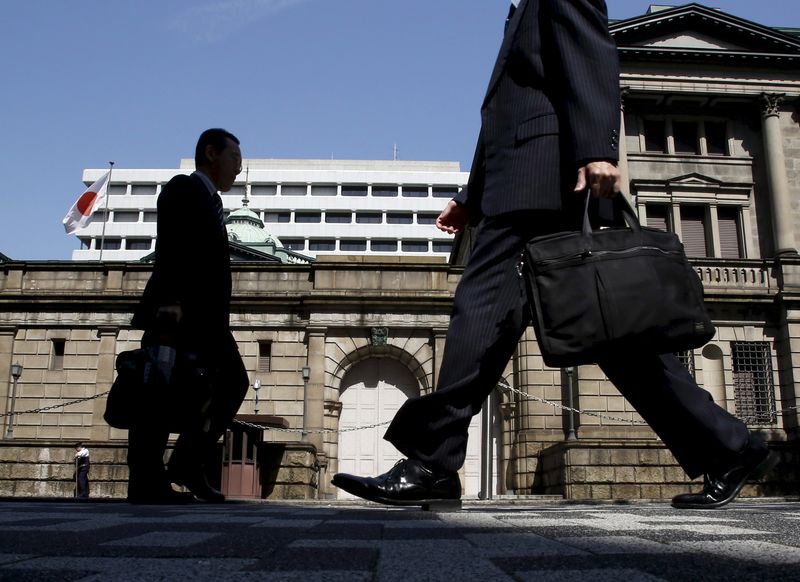By Leika Kihara
WASHINGTON (Reuters) - Bank of Japan officials are growing more receptive to stepping up monetary easing measures by buying more exchange-traded funds (ETF) invested in shares, as a stock market tumble and weak global growth threaten the country's fragile economic recovery.
BOJ policymakers are wary of intervening too heavily in the stock market, but its primary monetary easing tools - cutting interest rates and buying government bonds - are showing diminishing returns and have become less attractive since it adopted negative interest rates in January, sources familiar with the BOJ's thinking said.
The BOJ is currently buying about 3.3 trillion yen ($30 billion) of ETFs a year, which pales in comparison to the 80 trillion yen of government bonds it buys, under a stimulus policy it began in 2013 in a bid to end decades of stagnation and deflation.
After an initial uptick in growth and prices, Japan is back with flat growth and inflation, and the negative interest rate policy has proved deeply unpopular among banks and the public, limiting the BOJ's room for further cuts.
"ETFs and government bonds are two markets in Japan where there's room to increase the BOJ's purchases in huge amounts," one of the sources said.
BOJ policymakers are likely to debate the possibility of expanding stimulus at a rate review this month as the strong yen and weak external demand further cloud prospects for achieving their 2 percent inflation target.
An expansion of ETF buying may be among steps the BOJ would consider this month, though central bank officials say they won't rule out other measures, and could opt for a combination of steps, especially if it wants to get maximum market impact.
"Increasing ETF buying in huge amounts, combined with a modest increase in bond buying and an interest rate cut, could be the only way left to surprise markets," said a former BOJ executive who retains close contact with incumbent policymakers.
SCEPTICAL VOICES
BOJ Governor Haruhiko Kuroda has stressed his readiness to use all the tools available if the achievement of his inflation goal is at risk.
Given the adverse reaction to negative rates of minus 0.1 percent, a big move there looks unlikely, and since that policy also penalises banks for holding cash, it makes them less willing to sell bonds to the central bank, analysts say.
The BOJ's huge bond purchases are also drying up market liquidity, which further limits the scope for a large increase.
"They are crossing off a list of things that aren’t possible, and the only thing that’s left is buying ETFs," said Richard Jerram, economist at Bank of Singapore.
Japan's ETF market is just 15.8 trillion yen, of which the BOJ already holds about half, but ETFs can be easily cobbled together by brokerages, so there is scope for plenty more, given Japan's TOPIX stock market weighs in at 500 trillion yen.
The BOJ says it does not directly target stock prices and that its ETF buying is aimed at pushing down risk premiums, which helps lower long-term interest rates and therefore borrowing costs for companies.
But the central bank's presence in the market could assist stock prices, and in turn help boost business sentiment, analysts say.
Japanese shares fared well in the first two years or so after Kuroda introduced his stimulus measures, rising 70 percent to August 2015, but they have since lost half those gains.
Sceptics say buying ETFs in large volumes might help stop the rot, but could store up problems for the future.
"The BOJ will not easily be able retract this liquidity in the future without destabilizing markets," said Andrew Meredith, co-managing director at Tyton Capital Advisors.
There are doubts raised within the BOJ, too, but those voices are in retreat as Kuroda stretches the limits of monetary policy, and dissenters to his radical money-printing policies are being replaced by supporters, the sources say.
"I don't think worries about an exit are high on the list of the BOJ's priorities," said another source familiar with the BOJ's thinking.
HSBC projects the BOJ might raise annual purchases of ETFs to 13 trillion yen to show its determination to achieve its inflation target.
Jerram at Bank of Singapore said he was not convinced buying ETFs would help much with the BOJ's principal goals, however, as there wasn't a clear transmission into economic performance.
"They do something for the sake of doing something, and people see through that pretty quickly," he said.

($1 = 109.1900 yen)